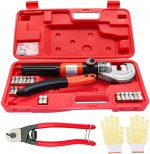- Joined
- Feb 19, 2020
- Threads
- 121
- Messages
- 12,891
I knew there was more than one way to get a rock solid good connection. For me it was just that the hydraulic crimper works best for me as I do lot more just lawn mower battery cables like my household 0000 cables that can have up to 200 amps going through or my truck battery cables that have at least 600+ amps going through them when I starting the motor.
The main point was don't do a poor job of fixing the cables like my example of what the customer did to keep from carrying his cable to get it fixed but ended up in my shop anyways because it failed.
The main point was don't do a poor job of fixing the cables like my example of what the customer did to keep from carrying his cable to get it fixed but ended up in my shop anyways because it failed.

